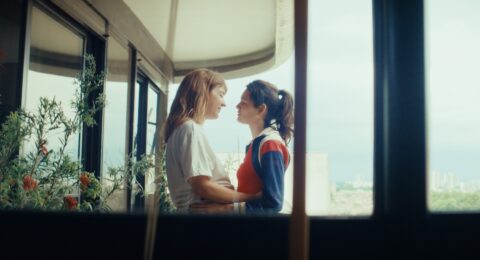“Avoid asking only your lesbian friends.”
In an early scene from Alice Douard’s Love Letters (2025), Céline (Ella Rumpf), a young DJ/sound technician and soon-to-be mother, sits across from her lawyer, listening as the realities of queer parenthood begin to take shape. She and her partner, Nadia (Monia Chokri), a dentist, are expecting a child in three months. Since Nadia will be giving birth, she will automatically be recognised as the legal mother. But Céline wants that same recognition — not just from those around them, but officially. On paper.
Under France’s Taubira Law, which allows same-sex couples to marry and adopt, she can pursue second-parent adoption. The process requires them to gather 15 written testimonials from friends and family, attesting to the love they share and their readiness to raise a child. Both women recognise the absurdity of it — proving, in writing, that their relationship and intentions are valid enough to satisfy the state.
This requirement sets off a ripple effect, bringing them back into contact with people from their pasts, including Céline’s estranged mother, Marguerite (Noémie Lvovsky), a renowned concert pianist. One of the film’s most haunting moments shows Céline standing inside a metro train, staring at a poster of her mother as the train pulls away. From across the platform, we watch her through the window — a simple yet profoundly symbolic image. It conveys not just distance, but a deep, almost unbridgeable void between them.
Love Letters doesn’t hinge on a single central conflict, and it’s all the more affecting for it. Douard paints a full, textured picture of what pregnancy and the path to legal parenthood actually feels like: the nerves, the paperwork, the physical discomfort. The awkwardness of asking people to vouch for your love. The surreal task of turning that love into legal documentation. She explores this emotional terrain with delicate assurance — and perhaps with the insight of someone who’s lived it, having gone through the French adoption process herself with her partner. That lived experience may be what gives the film its authenticity.
Chokri and Rumpf are both well-cast and have natural chemistry as a couple, capturing the low-simmering anxieties that come with not just becoming parents, but doing so while still figuring out who they are — to each other, to their families and to themselves. The film gently raises the stakes without forcing drama. Céline works nights. Nadia works days. On paper, it’s practical. But what happens once the baby arrives and they’re always passing each other by? What happens to their relationship, their careers, their intimacy? Their sense of self? These questions unfold with nuance and realism; not with speeches or crises, but through small silences, difficult conversations and everyday tenderness.
Douard isn’t interested in telling another trauma narrative. These characters have plenty of unresolved childhood pain, but she focuses on how queer people carry one another through life — with honesty, care, humor and love. While Love Letters is specifically about lesbian parenting, it also speaks to something broader in motherhood: the sacrifices and adjustments, the joy and fear, the reshaping of life around a new one. The ending may feel predictable, but the path toward it is filled with honesty and grace. The most important “love letter” arrives late in the film and it hits hard through voiceover — introspective, emotionally resonant and deeply attuned to the power of reconciliation.
Editor-at-large Jared loves movies and lives with Kiki in Berlin.





